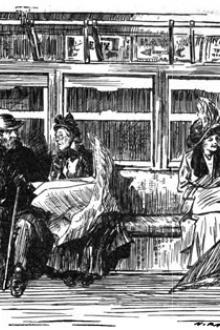Miss Hinch by Henry Sydnor Harrison (moboreader TXT) 📕

- Author: Henry Sydnor Harrison
- Performer: -
Book online «Miss Hinch by Henry Sydnor Harrison (moboreader TXT) 📕». Author Henry Sydnor Harrison
“Yes,” said the clergyman, “I have heard that she is remarkably clever—though, as a stranger in this part of the world, I never saw her act. I must say, it is all very interesting and strange.”
He turned his head and stared through the rear door of the car at the dark flying walls. At the same moment the woman turned her head and stared full at the clergyman. When he turned back, her gaze had gone off toward the front of the car, and he picked up the paper thoughtfully.
“I’m a visitor in the city, from Denver, Colorado,” he said presently, “and knew little or nothing about the case until an evening or two ago, when I attended a meeting of gentlemen here. The men’s club of St. Matthias’ Church—perhaps you know the place? Upon my word, they talked of nothing else. I confess they got me quite interested in their gossip. So to-night I bought this paper to see what this extraordinary woman detective it employs had to say about it. We don’t have such things in the West, you know. But I must say I was disappointed, after all the talk about her.”
“Yes, sir, indeed, and no wonder, for she’s told Mrs. Catherwood herself that she’s never made such a failure as this, so far. It seemed like she could always catch women, sir, up to this. It seemed like she knew in her own mind just what a woman would do, where she’d try to hide and all, and so she could find them time and time when the men detectives didn’t know where to look. But oh, sir, she’s never had to hunt for such a woman as Miss Hinch before!”
“No? I suppose not,” said’ the clergyman. “Her story here in the paper certainly seems to me very poor.”
“Story, sir! Bless my soul!” suddenly exploded the old gentleman across the aisle, to the surprise of both. “You don’t suppose the clever little woman is going to show her hand in those stories, with Miss Hinch in the city and reading every line of them!”
The approach to his station, it seemed, had roused him from his nap just in time to overhear the episcopate criticism. Now he answered the looks of the old woman and the clergyman with an elderly cackle.
“Excuse my intrusion, I’m sure! But I can’t sit silent and hear anybody run down Jessie Dark—Miss Matthewson in private life, as perhaps you don’t know. No, sir! Why, there’s a man at my boarding-place—astonishing young fellow named Hardy, Tom Hardy—who’s known her for years! As to those stories, sir, I can assure you that she puts in there exactly the opposite of what she really thinks!”
“You don’t tell me!” said the clergyman encouragingly.
“Yes, sir! Oh, she plays the game—yes, yes! She has her private ideas, her clues, her schemes. The woman doesn’t live who is clever enough to hoodwink Jessie Dark. I look for developments any day—any day, sir!”
A new voice joined in. The young couple down the car, their attention caught by the old man’s pervasive tones, had been frankly listening; and it was illustrative of the public mind at the moment that, as they now rose for their station, the young fellow felt perfectly free to offer his contribution:
“Tremendously dramatic situation, isn’t it, gentlemen? Those two clever women pitted against each other in a life-and-death struggle, fighting it out silently in the underground somewhere—keen professional pride on one side and the fear of the electric chair on the other. Good heavens, there’s—”
“Oh, yes! Oh, yes!” exclaimed the old gentleman rather testily. “But, my dear sir, it’s not professional pride that makes Jessie Dark so resolute to win. It’s sex jealousy, if you follow me—no offense, madam! Yes, sir! Women never have the slightest respect for each other’s abilities—not the slightest. No mercy for each other, either! I tell you, Jessie Dark’d be ashamed to be beaten by another woman. Read her stories between the lines, sir—as I do. Invincible determination—no weakening—no mercy! You catch my point, sir?”
“It sounds reasonable,” answered the Colorado clergyman, with his courteous smile. “All women, we are told, are natural rivals at heart—”
“Oh, I’m for Jessie Dark every time!” the young fellow broke in eagerly—“especially since the police have practically laid down. But—”
“Why, she’s told my young friend Hardy,” the old gentleman rode him down, “that she’ll find Hinch if it takes her lifetime! Knows a thing or two about actresses, she says. Says the world isn’t big enough for the creature to hide from her. Well! What do you think of that?”
“Tell what we were just talking about, George,” said the young wife, looking at her husband with grossly admiring eyes.
“But oh, sir,” began the old woman timidly,_ _”Jack Catherwood’s been dead two weeks now, and—and—”
“Woman got on my car at nine o’clock to-night, sir,” interjected the subway guard, who, having flung open the doors for the station, was listening excitedly to the symposium; “wore a brown veil and goggles. I’d ‘a’ bet every dollar I had —”
“Two weeks, madam! And what is that, pray?” exploded the old gentleman, rising triumphantly. “A lifetime, if necessary! Oh, never fear! Mrs. Victorian was considered pretty clever, eh? Wasn’t she? Remember what Jessie Dark did for her? Nan Parmalee. Too—though the police did their best to steal her credit. She’ll do just as much for Miss Hinch—you may take it from me!”
“But how’s she going to make the capture, gentlemen?” cried the young fellow, getting his chance at last. “That’s the point my wife and I’ve been discussing. Assuming that she succeeds in spotting this woman-devil, what will she do? Now—”
“Do, sir! Yell for the police!” burst from the old gentleman at the door.
“And have Miss Hinch shoot her—and then herself, too? Wouldn’t she have to —”
“Grand Central!” cried the guard for the second time; and the young fellow broke off reluctantly to find his pretty wife towing him strongly toward the door.
“Hope she nabs her soon, anyway,” he called back to the clergyman over his shoulder. “The thing’s getting on my nerves. One of these kindergarten reward-chasers� followed my wife for five blocks the other day, just because she’s got a pointed chin, and I don’t know what might have happened if I hadn’t come along and—”
Doors rolled shut behind him, and the train flung itself on its way. Within the car, a lengthy silence ensued. The clergyman stared thoughtfully at the floor, and the old woman fell back upon her borrowed paper. She appeared to be re-reading the observations of Jessie Dark with considerable care. Presently she lowered the paper and began a quiet search for something under the folds of her shawl; and at length, her hands emerging empty, she broke the silence with a timid request:
“Oh, sir—have you a pencil you could lend me, please? I’d like to mark something in the piece to send to Mrs. Catherwood. It’s what she says here about the disguises, sir.”
The kindly divine felt in his pockets, and after some hunting produced a pencil—a fat white one with blue lead. She thanked him gratefully.
“How is Mrs. Catherwood bearing all this strain and anxiety?” he asked suddenly. “Have you seen her to-day?”
“Oh, yes, sir. I’ve been spending the evening with her since seven o’clock, and am just back from there now. Oh, she’s very much broke up, sir.”
She looked at him hesitatingly. He stared straight in front of him, saying nothing, though he knew, in common with the rest of the reading world, that Jack Catherwood’s mother lived, not on 126th Street, but on East Tenth. Presently he wondered if his silence had not been an error of judgment. Perhaps that misstatement had not been a slip, but something cleverer.
The woman went on with a certain eagerness: “Oh, sir, I only hope and pray those gentlemen may be right, but it does look to Mrs. Catherwood, and me too, that if Jessie Dark was going to catch her at all, she’d have done it before now. Look at those big, bold blue eyes she had, sir, with lashes an inch long, they say, and that terrible long chin of hers. They do say she can change the color of her eyes, not forever of course, but put a few of her drops into them and make them look entirely different for a time. But that chin, sir, ye’d say —”
She broke off; for the clergyman, without preliminaries of any sort, had picked up his heavy stick and suddenly risen.
“Here we are at Fourteenth Street,” he said, nodding pleasantly. “I must change here. Good night. Success to Jessie Dark, I say!”
He was watching the woman’s faded face intently, and he saw just that look of respectful surprise break into it that he had expected.
“Fourteenth Street, sir! I’d no notion at all we’d come so far. It’s where I get out too, sir, the expresses not stopping at my station.”
“Ah?” said the clergyman, with the utmost dryness.
He led the way, limping and leaning on his stick. They emerged upon the chill and cheerless platform, not exactly together, yet still with some reference to their acquaintanceship on the car. But the clergyman, after stumping along a few steps, all at once realized that he was walking alone, and turned. The woman had halted. Over the intervening space their eyes met.
“Come,” said the man gently. “Come, let us walk about a little to keep warm.”
“Oh, sir -it’s too kind of you, sir,” said the woman, coming forward.
From other cars two or three blue-nosed people had got off to make the change; one or two more came straggling in from the street; but, scattered over the bleak concrete expanse, they detracted little from the isolation that seemed to surround the woman and the clergyman. Step for step, the odd pair made their way to the extreme northern end of the platform.
“By the way,” said the clergyman, halting abruptly, “may I see that paper again for a moment?”
“Oh, yes, sir -of course,” said the woman, producing it from beneath her shawl. “If you want it back, sir—”
He said that he wanted only to glance at it for a moment; but he fell to looking through it page by page, with considerable care. The woman glanced at him several times with timid respect. Finally she said hesitatingly:
“I think, sir, I’ll ask the ticket-chopper how long before the next train. I’m very late as it is, sir, and I still must stop to get something to eat before I go to bed.”
“An excellent idea,” said the clergyman.
He explained that he, too, was already an hour behind time, and was spending the night with cousins in Newark to boot. Side by side, they retraced their steps down the platform, ascertained the schedule from the sleepy chopper, and. as by some tacit consent, started slowly back again. But, before they had gone very far, the woman all at once stopped short and, with a white face, leaned against the wall.
“Oh, sir, I’m afraid I’ll just have to stop and get a bite somewhere before I go on. You’ll think me foolish, sir, but I missed my supper entirely to-night, and there is quite a faint feeling coming over me.”
The clergyman looked at her with apparent concern. “Do you know, my





Comments (0)